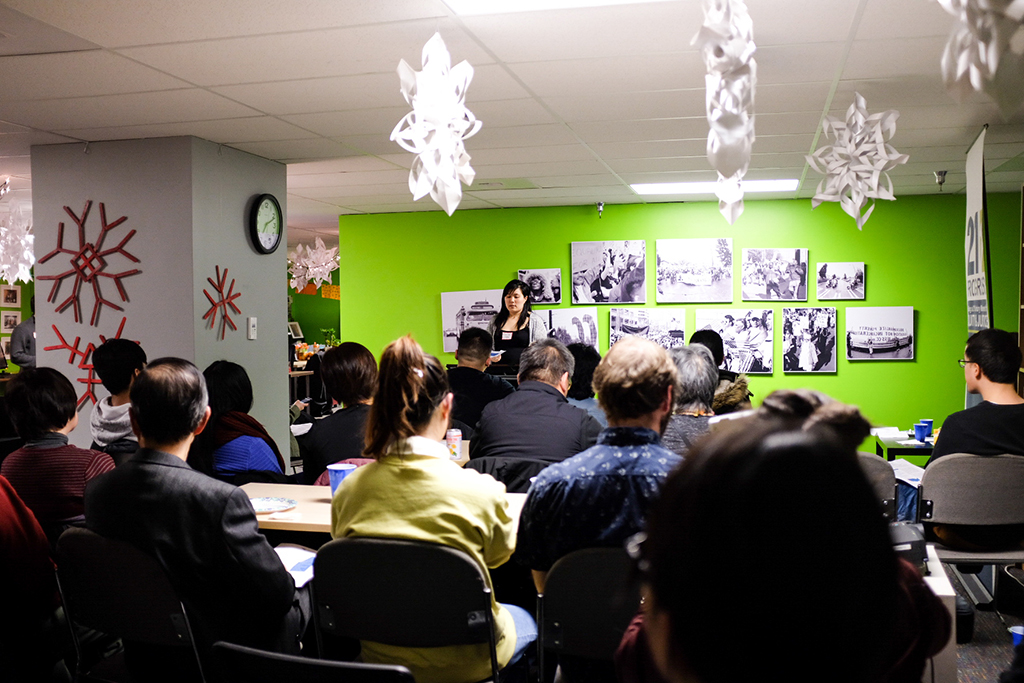By Stacy Nguyen
Northwest Asian Weekly

Eunice How, president of the Seattle chapter of the Asian Pacific American Labor Alliance addresses attendees of the wrongful death amendment campaign launch (Photo by Sam Le)
“The most shocking day of our lives was when Haram was taken from us in the Ride the Ducks crash … Since then, we have lived in pain,” Soon Won Kim said in a statement read on Jan. 5 at the Wrongful Death Law Amendment Campaign Launch, hosted by the Chinese American Citizen Alliance (CACA).
“Haram was the best daughter and sister. She talked to us every day for at least an hour, even when she was in America. We were so proud of her and loved her so much. There is not a single day that goes by without us thinking about her, struggling with our loss, and missing her.”
This launch was held at 21 Progress in Chinatown/International District and was in response to an accident that occurred Sept. 24, 2015, in which a North Seattle College charter bus was hit by a defective Ride the Ducks tourist vehicle on Aurora Bridge.
Five international students — Haram Kim (Soon Won Kim’s daughter, from South Korea), Runjie Song (China), Mami Sato (Japan), Ivan Putradanto (Indonesia), and Claudia Derschmidt (Austria) — were killed. Sixty-nine others were injured.
According to state law (RCW 4.20.020, approved by the governor on March 14, 1917), parents may bring wrongful death claims over the death of an adult child if they can prove financial dependency on the child. Washington state is only one of three states in the country that requires parents to be financially dependent on their adult children. (The others are California and Alaska.) Also in Washington, a parent cannot claim negligent death of a child after the child turns 18, even if the child was injured before that age.
Additionally, according to RCW 4.20.020, parents can only claim wrongful death only if they “are a resident within the United States at the time of his [or her] death.”
Literature from the Washington State Association for Justice (WSAJ) states that the law came from a time when children were farmhands — economically beneficial to their families — and are also rooted in xenophobia against Chinese nationals working in Washington in the 1900s. Current law dictates that the state is not liable for wrongful death based on national origin.
“We are embarrassed that we are treated different than American citizens,” Kim wrote in his statement, “and that Haram’s death means less because we do not live in the U.S. The unfairness hurts us. We don’t understand how a 100-year-old discrimination law can be used against our daughter and our family in a modern age.” After her death, Haram’s family donated her organs, and they were used to save 10 Washington residents.

Sen. Bob Hasegawa, sponsor of SB 6015, at the wrongful death amendment campaign launch (Photo by Sam Le)
Two amendments correcting the law have been sponsored by Rep. Sharon Tomiko Santos and Sen. Bob Hasegawa, HB 2262 and SB 6015, respectively.
“I am very hopeful that this bill, which will bring us in line with 47 other states, will help bring some sense of justice and closure for the families,” Hasegawa said in a statement that was read at the meeting. “The wrongful death law … is an example of the harmful xenophobia and racism that has been allowed to stay in our state’s laws for far too long.”
According to Seattle Japanese American Citizens League (JACL) President Joseph Lachman, the bills were prefiled on Dec. 6 and Dec. 8, 2017. On Jan. 11, the House will have its first hearing on the bill.
The law can affect others beyond non-citizens. According to WSAJ, the supporters of these amendments include crime victims’ organizations, the disability community, members of the labor movement, and emergency responder organizations.
“On Jan. 23, we will be having APA Legislative Day, to send down a leadership delegation to Olympia to advocate on behalf of these communities,” said Lachman. “We’ll also have meetings with the governor, senate majority leaders, speaker of the house, and other elected officials to talk about legislative priorities.”
Ming-Ming Tung-Edelman, from the CACA, said that part of the reason this law has not changed yet is due to insurance companies lobbying against amendments, as it will cost them in payouts. Others stated that opposition to amendments like these in years past centered around things as benign as procedural methods.
“Pushback consistently seems to be the cost to the state [though],” added Lachman.
“This is something that affects more than a few people,” said Fred Yee, a community volunteer. “You can imagine how many people and families who are affected by this law, and they don’t even know. Your support of the amendment is very important.”
“We need all the signatures so that when our lawmakers go back and present this, they can say, look it’s not just a few groups, ‘We have all these signatures,’” said Tung-Edelman.
“If this law is not amended, the tears of our family members will never cease and will be repeated constantly,” said Kim. “I hope the Washington government will see our pain, see the injustice of its laws, and make things better for other families in the future.”
The Wrongful Death Law Coalition is made up of the National Asian Pacific American Women’s Forum–Seattle (NAPAWF), the JACL, the Asian Pacific American Labor Alliance–Seattle Chapter (APALA), the CACA, the ASUW Asian Student Commission (ASUW ASC), and the OCA–Asian Pacific American Advocates, Greater Seattle Chapter (OCA).
The campaign organizers would like to gather more support of these amendments. To submit a comment to legislators, visit leg.wa.gov and click “Find Bills” or “Bill Information.” Enter “HB 2262” or “SB 6015,” search, then provide comments. People can also call the legislative hotline at 800-562-6000. Questions can be directed to wrongfuldeathcoalition@gmail.com.
Stacy Nguyen can be reached at stacy@nwasianweekly.com.


